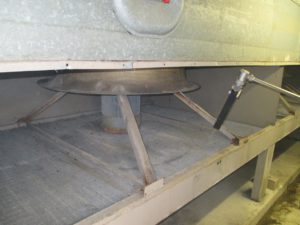The technical director of the Gütersloh hospital contacted Kipp Umwelttechnik GmbH about having the finned heat exchanger in the hospital’s recooling register cleaned with JetMaster, developed by its sister company mycon GmbH.

Removing lime scale from heat exchangers in a hospital
There were approximately 40 m2 of heat exchanger to be cleaned. The immense level of calcification in the dry coolers made the cleaning especially urgent.
Hospitals could not function without effective cooling systems: temperatures play an important role in hospitals and clinics and many rooms need to be air-conditioned.
But many diagnostic tests and operations would also not be feasible without cooling. Computer tomography and some equipment in operating rooms will run in an uncooled environment only for a short while. IT devices also produce heat that must be dissipated.

Removing lime scale from heat exchangers in a hospital
The demand for cooling in a hospital setting is thus particularly challenging and equipment must always be available and ready for use. Industrial dry coolers are specifically designed and constructed to ensure reliable cooling of all devices, for example, with diesel or gas engines.
The Gütersloh Hospital operates its dry cooling system separate from the building systems room. For several years, these dry coolers were no longer performing as needed on hot days. To achieve sufficient condensation of the refrigerant, water sprinklers were set up facing the dry coolers. While this initially had successful results, over time it led to a complete calcification of the dry coolers. Air was no longer able to pass through. This greatly reduced the effectiveness of the heat exchangers.
To determine the current amount of air flowing through the dry coolers, Kipp Umwelttechnik GmbH conducted a simple test. A bucket of water was poured on top of the dry coolers, but not a drop of water passed through at the bottom. This made clear the extreme level of calcification in the coolers that the company had been called in to tackle.
Kipp Umwelttechnik GmbH was able to clean the dry coolers completely using the JetMaster process and return them to full operation. A highly diluted descaling agent was first sprayed into the dry coolers with the JetMaster. This caused the calcification to swell visibly. Then, the coolers were immediately cleaned with clear water, thus fully restoring the air flow through the dry coolers in just a short time.
The specially developed JetMaster cleaning method caused no damage to the delicate fins of the registers and dry coolers, unlike conventional high-pressure cleaners. It was not only surface cleaning, but a thorough cleaning to the core using the patented JetMaster technology. The cleaning equipment uses much less water and cleaning chemicals than conventional high-pressure cleaners. This makes the JetMaster cleaning method suitable for sensitive environments (such as indoor spaces). The energy savings was achieved by reducing air resistance, improved heat and cold transfer and, in particular, by increasing the COP (coefficient of performance) of the cooling system by cleaning the dry coolers. Unpleasant odors, such as can occur in rooms with contaminated convectors, are effectively prevented, thus improving the well-being of room users.


